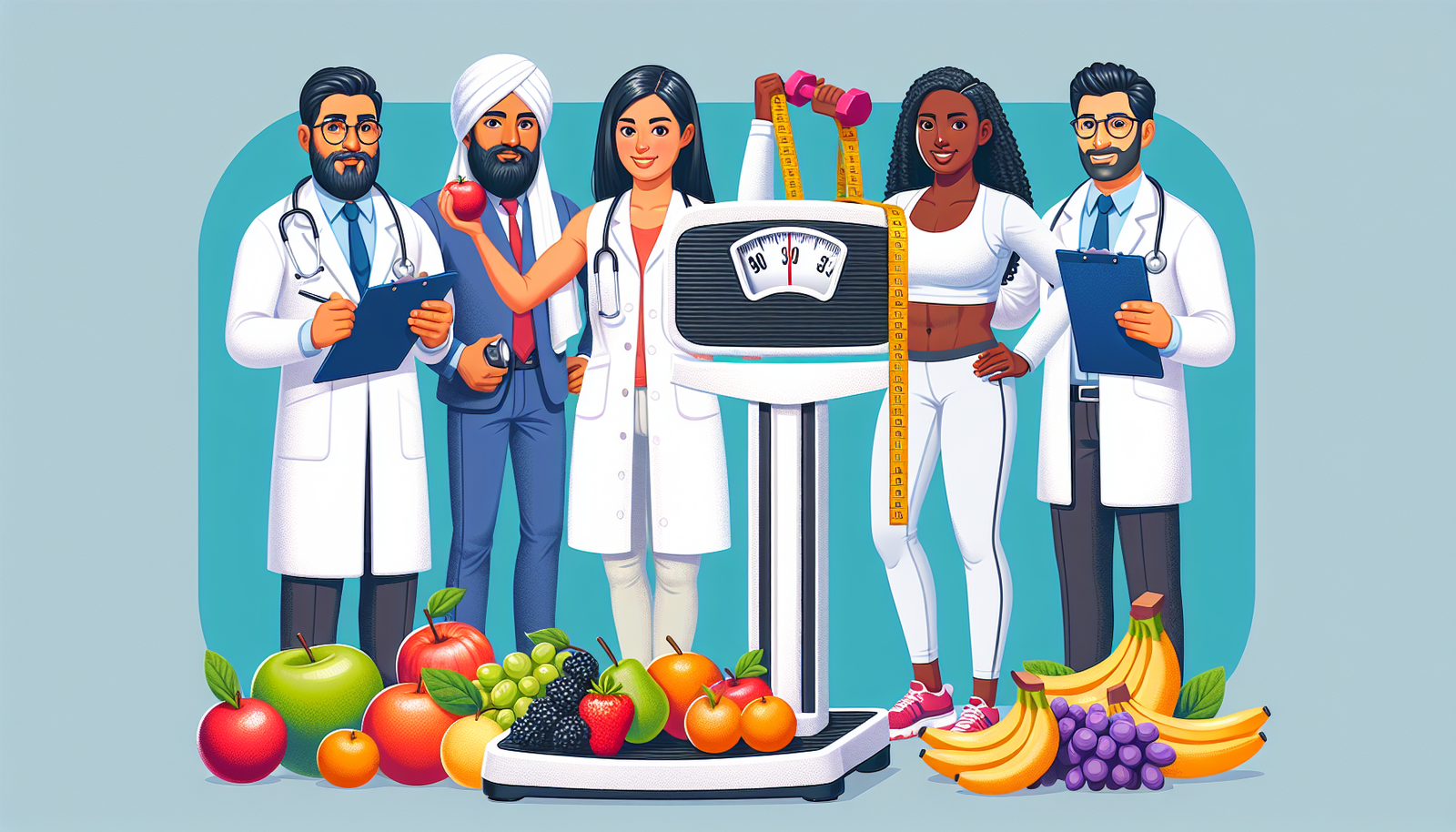
Today, you might wonder how much influence healthcare professionals actually have when it comes to achieving weight loss. In the article “Examining the Role of Healthcare Professionals in Weight Loss”, you’ll find remarkable insights into the impact that doctors, nurses, dietitians, and others in the medical profession can have on a patient’s journey towards healthier living. With a focus on behavioral interventions, nutritional counseling, and exercise regimens, this engaging piece sheds light on the critical role these professionals play, and how they are crucial to making sustainable weight loss achievable.

Understanding Obesity and Overweight Issues
When it comes to your health, understanding obesity and overweight issues is essential. But what exactly does it mean to be overweight or obese?
Definition of obesity and overweight
Obesity and overweight are terms used to describe having an excess amount of body fat. Body Mass Index (BMI) is a tool widely used to determine whether you are overweight or obese. It is a measure of body fat, calculated by dividing your weight by the square of your height. If your BMI falls between 25 and 29.9, you are considered overweight. If your BMI is 30 or higher, you are diagnosed as obese.
The global prevalence of obesity
Sadly, obesity is a global epidemic. The World Health Organization reported in 2016 that over 1.9 billion adults were overweight, and of these, around 650 million were obese. That’s about 13% of the world’s adult population. The prevalence of obesity has nearly tripled since 1975.
Causes and contributing factors of obesity
You may be asking yourself, what causes obesity? This is a complex condition with numerous contributing factors. These include genetics, behavior, and environment. Other factors like eating a high-calorie diet, lack of physical activity, medication side effects, and certain health conditions can contribute to weight gain.
The impact of obesity on health
Did you know that obesity can negatively impact almost every aspect of your health? It increases the risk of heart diseases, high blood pressure, stroke, type 2 diabetes, and certain types of cancer. Obesity can also lead to mental health issues such as depression and can affect your quality of life.
General Role of Healthcare Professionals in Healthcare
Healthcare professionals play several vital roles in healthcare. They are your lifeline, your guide, and your partner in achieving better health and wellness.
Patient assessment and diagnosis
First off, healthcare professionals assess the patient’s health and diagnose any existing conditions. This typically involves a physical examination, medical history review, and multiple diagnostic tests.
Treatment planning and implementation
Next, the healthcare professional will develop a treatment plan tailored to your needs. This may involve lifestyle changes, medication, or other therapy. Once a plan is prepared, they will help you implement it.
Regular monitoring and modification of treatment plans
Healthcare isn’t a one-and-done deal. Regular check-ups are necessary to monitor your progress and make any necessary adjustments to your treatment plan.
Patient education and empowerment
Lastly, healthcare professionals educate and empower patients, providing you with daily care knowledge and encouraging self-management skills.
Healthcare Professionals Involved in Weight Management
Layers of specialists dedicated to your weight management journey are an essential part of each step.
Primary Care Physicians
Your primary care physician is typically the one to flag weight issues. They play a vital role in identifying overweight and obese patients, and formulating general treatment strategies.
Nutritionists or Dietitians
When it comes to losing weight, your diet matters just as much as your exercise routine. This is where dietitians and nutritionists come in. They’re the experts on food and nutrition.
Endocrinologists
If you’ve been struggling with weight loss for a long time, there could be an underlying hormonal issue at play. Endocrinologists are the best people to turn to for this issue as they specialize in the body’s hormone-producing glands.
Physiotherapists or Exercise Physiologists
Incorporating physical activity into your weight loss plan is essential. Physiotherapists or exercise physiologists can develop a personalized exercise program suited to your needs and capabilities.
Psychologists or Psychiatrists
Weight loss is as much a mental battle as it is a physical one. Psychologists and psychiatrists can help address mental health issues and provide support for behavioral changes.

Role of Primary Care Physicians in Weight Loss
As a patient, your first point of contact is often with your primary care physician.
Identification of overweight and obese patients
Primary care physicians play a pivotal role in the identification of overweight and obese individuals. They can determine obesity risks and diagnose obesity through a physical examination and medical history review. They can also use tools like the BMI.
Formulating general treatment strategies
Once a diagnosis has been confirmed, your primary care physician forms a general treatment strategy. This may include recommendations to change your lifestyle, such as eating more healthily and increasing physical activity.
Referral to specialist healthcare professionals
In some cases, primary care physicians may refer patients to other healthcare professionals such as nutritionists, endocrinologists, or psychologists for a more specialized approach to weight loss.
Ongoing monitoring of patient’s progress
The primary care physician stands by you throughout the entire weight management journey. They regularly monitor your progress and adjust the treatment plan as necessary.
Role of Nutritionists or Dietitians in Weight Loss
The importance of your diet in weight management should not be underestimated. Let’s look at the role nutritionists or dietitians play in the weight loss process.
Assessment of patient’s diet
Nutritionists or dietitians start with a comprehensive assessment of your diet. They look at your eating habits, food choices, and nutritional intake.
Development of personalized nutrition plans
Based on your assessment, they can create a personalized nutrition plan matching your weight loss goals, preferences, lifestyle, and health needs.
Monitoring of dietary adherence and results
Your dietitian will also monitor your dietary adherence and the results of your diet plan. They adjust the plan as necessary and ensure it is contributing to weight loss.
Educating patients about healthy eating habits
Education is an essential part of a dietitian’s role. They educate you about healthy eating habits, portion control, and meal planning.
Role of Endocrinologists in Weight Loss
Endocrinologists provide valuable insight into how hormones affect weight, metabolism, and overall health.
Examination of potential hormonal issues
Endocrinologists examine your hormonal balance. Hormones such as insulin, thyroid hormones, and sex hormones play an important part in weight management.
Adjustment of medication affecting weight
If medication is causing weight gain, endocrinologists can adjust the dosage or recommend alternatives.
Assisting in managing weight-related conditions like diabetes
Endocrinologists often help manage weight-related conditions like diabetes and polycystic ovary syndrome (PCOS).
Monitoring of patient’s overall endocrine health
It is essential for endocrinologists to monitor your endocrine health, ensuring hormonal imbalances don’t hinder your weight management journey.
Role of Physiotherapists or Exercise Physiologists in Weight Loss
Exercise is a key element in the weight loss equation. Let’s look at the role of physiotherapists and exercise physiologists in your weight loss journey.
Development of individualized exercise programs
Every person has different physical abilities and goals, so a one-size-fits-all approach to exercise doesn’t work. Specialized healthcare professionals can develop a comprehensive, individualized exercise program considering your abilities, needs, and goals.
Ensuring safe and effective exercise
Exercise physiologists or physiotherapists will ensure your exercise routines are safe and effective. They demonstrate correct exercise techniques and provide injury prevention education.
Monitoring of patient’s fitness progress
The regular monitoring of your fitness progress ensures that you’re on the right track. It allows for adjustments in the exercise program if necessary.
Educating patients about the importance of physical activity
Healthcare professionals also educate you about the importance of staying physically active, explaining the benefits and how to overcome potential obstacles.
Role of Psychologists or Psychiatrists in Weight Loss
Mental health plays a significant role in weight loss, making psychologists and psychiatrists integral to the process.
Addressing underlying mental health issues
Several mental health issues can contribute to weight gain or make weight loss difficult, such as depression, anxiety, and eating disorders. Psychologists or psychiatrists can identify and treat these underlying issues.
Providing support for behavioral changes
Making lifestyle changes is challenging. Psychological support can help manage the emotional side of these changes.
Helping patients handle stress and emotional eating
Emotional eating is a common obstacle in losing weight. Mental health professionals provide methods to better handle stress and avoid emotional eating.
Implementing motivational strategies for weight loss success
Maintaining motivation throughout a weight loss journey can be challenging. Psychologists and psychiatrists can implement motivational strategies to help you stay focused on your weight loss goals.
Integrative Approach to Weight Loss
Given how complex weight loss is, a coordinated and integrative approach is crucial for successful weight management.
Coordination among different healthcare professionals
Successful weight management requires collaboration among various professionals. Your primary care physician, nutritionist, endocrinologist, physiotherapist, and psychologist all need to work cohesively for effective treatment planning and implementation.
Considering patient’s physical, dietary, psychological needs
Taking care of your all-round needs is vital in weight loss. Your healthcare team considers your physical health, dietary needs, and psychological well-being when designing your treatment plan.
Regular assessment and adjustments of treatment plan
Your treatment plan will need regular assessment and potential adjustments. Your healthcare team will monitor your progress and modify your plan as necessary to ensure it is working for you.
Holistic patient care for sustained weight loss
With an integrative approach, your healthcare team aims for holistic patient care. They provide multilayered support throughout your journey, working to ensure your weight loss is not just short-term but sustained in the long run.
Challenges for Healthcare Professionals in Managing Weight Loss
The road to weight loss is not without obstacles. Healthcare professionals face several challenges in managing weight loss.
Patient’s adherence to treatment plan
One of the significant challenges healthcare professionals face is ensuring patients stick to their treatment plan. It involves consistent motivation and support to the patient.
Balancing weight loss expectations and reality
Patients often have high expectations about weight loss. Managing these expectations and aligning them with reality can be quite challenging.
Handling complex cases or comorbidities
Healthcare professionals often deal with patients having multiple health conditions alongside obesity. It often requires careful planning and treatment coordination.
Dealing with social and cultural factors influencing obesity
Obesity is influenced by social and cultural factors. Understanding these elements and working on solutions around them can be a complex process for healthcare professionals.
In conclusion, addressing weight loss is a multifaceted process requiring an entire team of healthcare professionals. From assessment to diagnosis, treatment planning, implementation, monitoring, and patient education, every stage is crucial for a successful weight loss journey. Despite numerous challenges, an integrative approach ensures holistic care geared towards sustainable weight loss and improved overall health.





Leave a Reply